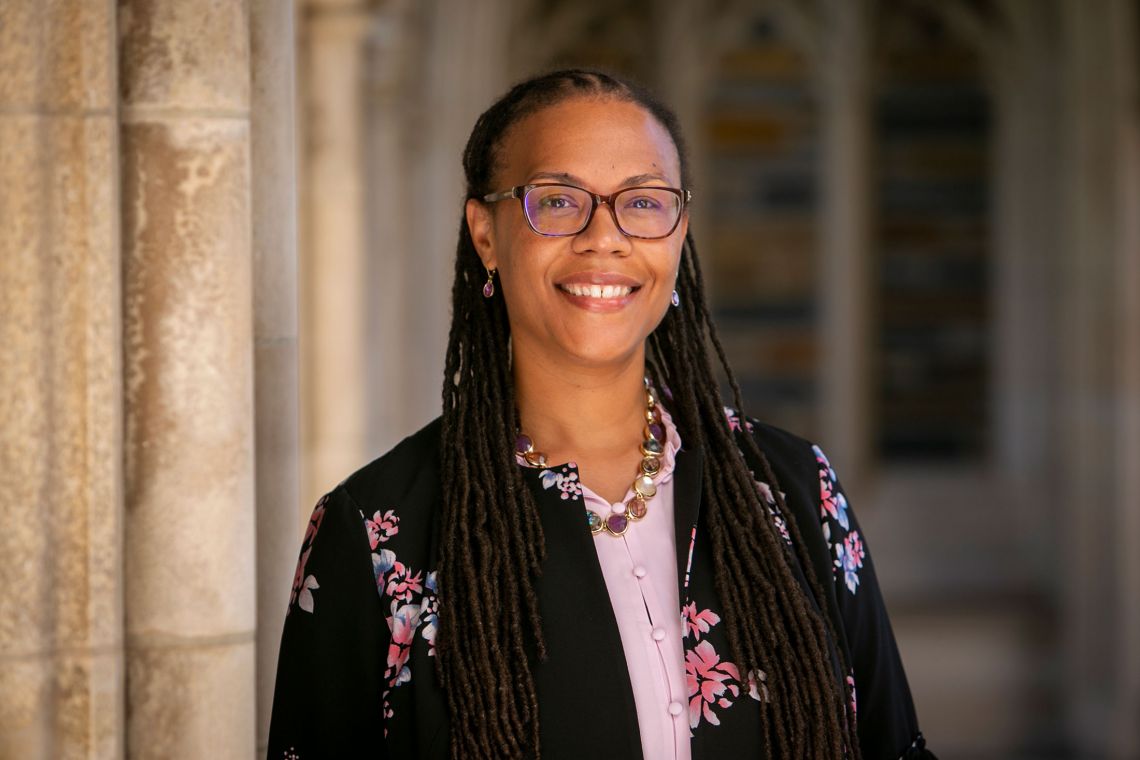Adrienne Stiff-Roberts Named Presidential Fellow for 2022-23 Academic Year
Pratt professor will participate in strategic and operational discussions across the university

In nearly two decades at Duke, engineering professor Adrienne Stiff-Roberts has balanced her research and teaching efforts with deep dives into university service and governance.
In work on the Academic Council, a subcommittee of the Racial Equity Advisory Council, the Academic Programs Committee and other panels, Stiff-Roberts has explored the workings of the wider university and of units outside her home at the Pratt School of Engineering.
Read MoreWith each effort, she came away learning something new about the university. “What I’ve found is the more you learn about how the university works, the more you realize how much you still don’t know,” said Stiff-Roberts, the Jeffrey N. Vinik Professor of Electrical and Computer Engineering.
Over the next year, she will get a closer look at university decision-making at the highest levels. As the second Presidential Fellow, Stiff-Roberts will work with members of the President’s Cabinet, participate in meetings with trustees and senior leaders of the university and, in the spring, coordinate a project in support of a university priority.
The fellowship was launched last year by President Vincent Price with the aims to prepare promising faculty for future leadership roles by providing them with the opportunity to interact closely with and receive mentorship from the president and other senior leaders at Duke and to observe leadership in action through direct participation in leadership meetings and specific projects of interest to both the fellow and the president’s office. The program seeks to empower bold thinkers at Duke, one of the five planks of the presidential strategic framework.
A central goal of the program is to develop the talents of a diverse cohort of faculty leaders for Duke’s future. Sociology and health policy scholar Tyson Brown served as the inaugural presidential fellow during the 2021-2022 academic year.
“I am thrilled that Adrienne Stiff-Roberts is serving as our next presidential fellow,” Price said. “An award-winning researcher, student mentor, and teacher, Adrienne is making groundbreaking discoveries in the fields of materials science and electrical engineering. We look forward to engaging her in strategic and operational discussions and benefitting from her guidance and partnership in the months ahead.”
“My experiences in university service showed me that if you want to make an impact at a university beyond your academic work, you need to know how things work elsewhere.”
-- Adrienne Stiff-Roberts
As part of her fellowship, Stiff-Roberts will complete rotations across the administrative units reporting to the President, from Duke Health to the Office of Counsel, providing opportunities for mentorship, and to observe and learn and engage in operational and strategic decision making. She will also participate in meetings of the Board of Trustees, the Senior Leadership Group, the President’s Cabinet, the Deans Cabinet, and certain presidential and provostial committees. She will also meet regularly with President Vincent Price.
During the fellowship, Stiff-Roberts will build a range of connections and networks across the university that few faculty members have.
“It’s a great opportunity to get a bird’s eye view of university operations, to understand how the pieces of the university fit together,” Stiff-Roberts said. “And the second part is there’s the opportunity to do a project on a topic that interests me and where I can make a contribution to the university. These are what have me excited.”
She sees the fellowship as building on her record of university service through faculty governance. “My experiences in university service showed me that if you want to make an impact at a university beyond your academic work, you need to know how things work elsewhere,” Stiff-Roberts said.
“In so many ways, the faculty are in the trenches in all aspects of the primary missions of the university. That, coupled with the principles of academic freedom, are what make faculty governance so important. So, when you need change at a university, it’s going to be most effective if it comes with buy-in from the faculty, and that can be a challenge. That’s something I want to get out of the fellowship: how to spur that change from the bottom up.”